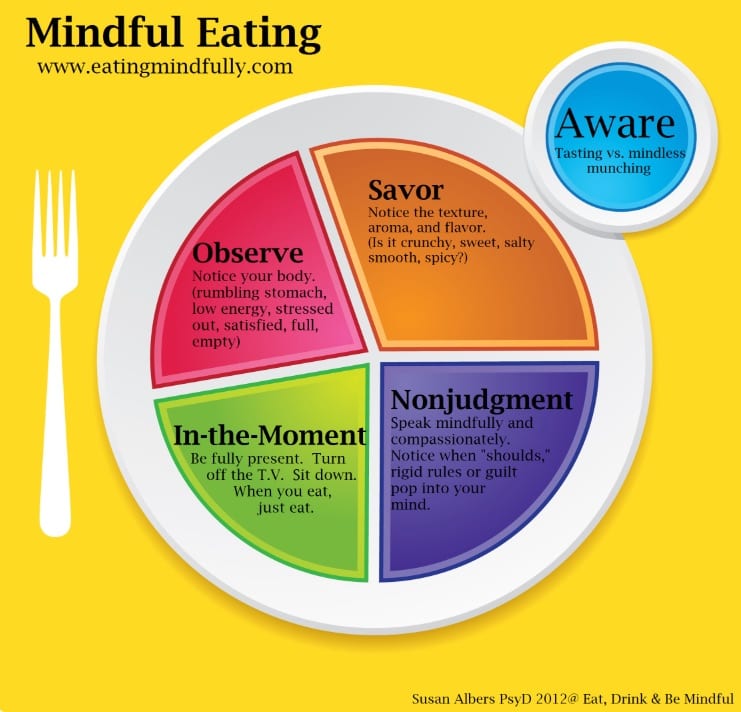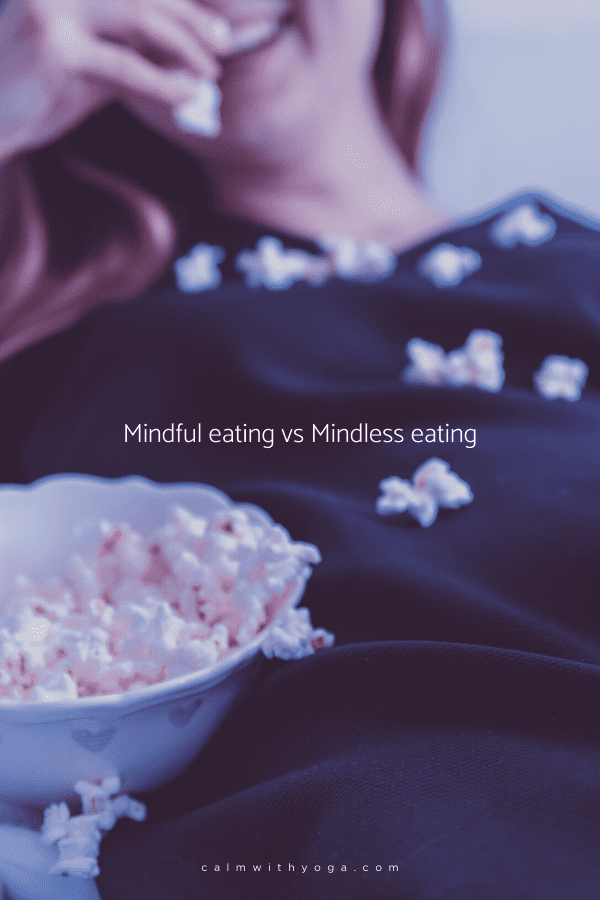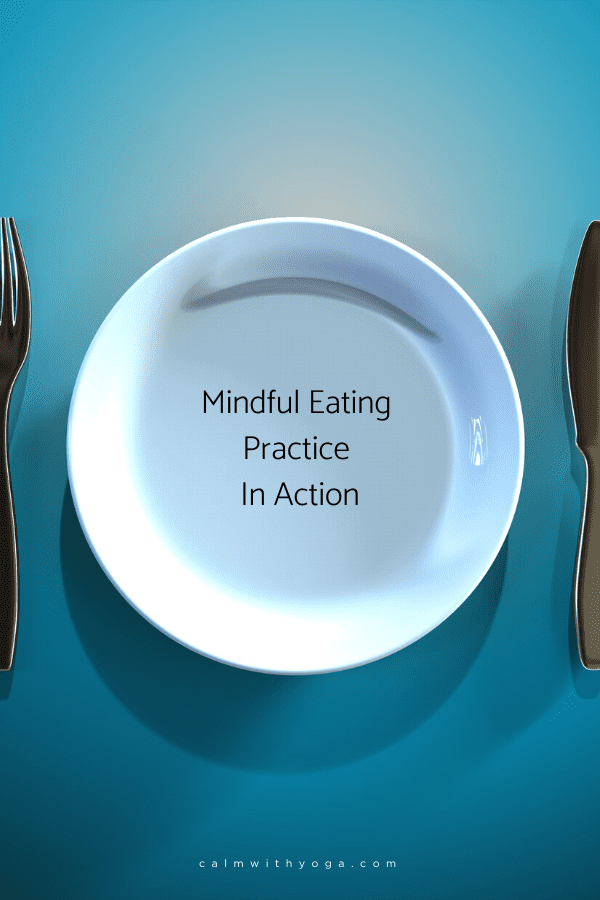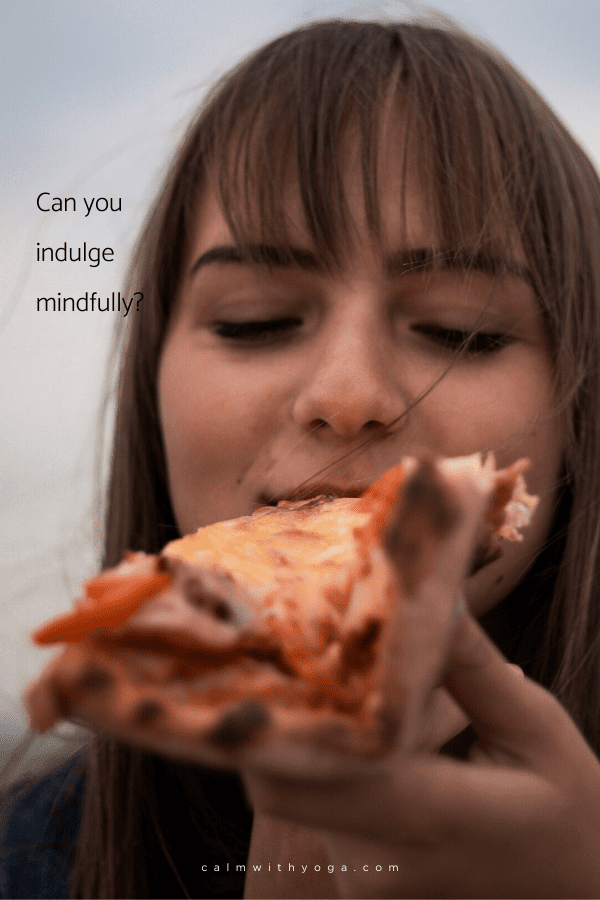“Mindful eating replaces self-criticism with self-nurturing.
It replaces shame with respect for your own inner wisdom.”
– Roshi Dr. Jan Chozen Bays, Pediatrician, Zen Buddhist Teacher, & Author
Are you familiar with the feeling of overeating to the point you had to unbutton your pants?
Or have you ever opened a bag of potato chips in front of the couch to watch TV and then realized you ate almost the entire bag?
Or maybe you’ve had an unusually stressful or hard day and immediately turn to rich foods for comfort.
It’s likely we’ve all been there at one point or another, right?
Given the fast-paced busy-ness of our modern lives, most of us are used to skipping meals, multitasking by eating at our desks or by watching TV, and scarfing down our food quickly so we can move onto the next task.
Over time these eating habits can create ripple effects that infiltrate other aspects of our lives and overall health.
Chronic mindless eating can lead to:
- Increased stress levels and anxiety
- Compromised gut health and digestion
- Increased inflammation and bloating
- Reduced sleep quality
- Low energy levels
- Brain fog and mental haziness
- Low libido
- Compromised immune function
- Weight gain
Many of us are not only disconnected from our bodies, but we’re also disconnected from the food we eat.
Often times we’re not deliberate about what we eat, how we eat, when we eat, or even why we eat.
In fact, many of us (especially women) struggle with emotional eating and/or binging as a way to cope with uncomfortable emotions, stress, anxiety, and overwhelm.
These eating behaviors can quickly cause us to get stuck in guilt and shame ridden patterns.
But it doesn’t have to be this way.
There is another possibility.
We can empower ourselves and improve our overall health and well-being by bringing awareness and intent to our eating experiences.
We can transform the process of eating and nourishing ourselves from guilt-ridden and painful to inspiring, pleasurable, and joyful.
It just takes a little commitment, a little willingness, a little self-love, and yes, a little knowledge.
The practice of mindful eating can help us get there…
What is Mindful Eating?

“A small yet growing body of research suggests that a slower, more thoughtful way of eating could help with weight gain and maybe steer some people away from processed food and other less-healthful choices.
This alternative approach has been dubbed “mindful eating.”
It’s based on the Buddhist concept of mindfulness, which involves being fully aware of what is happening within and around you at the moment.
In other areas, mindfulness techniques have been proposed as a way to relieve stress and alleviate problems like high blood pressure and chronic gastrointestinal difficulties.”
– Harvard Health
Mindful eating is a clinically proven method that can help improve digestion, stress, inflammation, and anxiety.
Eating mindfully can help us become more aware of our blind spots, autopilot tendencies, and knee jerk reactions around food.
It can help us identify what we’re unconsciously reaching for because we’re seeking comfort, pleasure, or just want to numb out.
In this way, mindful eating teaches us to distinguish the intentions behind our food choices at any given moment.

Dr. Susan Albers, a mindful eating expert, and psychologist suggests asking yourself these four questions when you can’t tell if you’re emotionally hungry or physically hungry:
Do I want to eat for energy to fuel my body to make it through the day or am I looking for relief or a sense of safety/security?
Am I eating in response to physical hunger (rumbling stomach, low energy, etc.) or am I feeling scared, frustrated, overwhelmed or happy?
Am I choosing nutrient rich foods or sugary, fatty salty foods?
Am I building a healthy relationship with food vs. anxiety, guilt or fear?
If we get in the habit of asking these questions daily we’ll be able to gradually transform emotional eating into healthy eating.
We’ll intentionally choose our food more wisely and from the perspective of asking additional questions such as:
“Does this choice truly nourish me?”
“How will I feel after I eat this?”
“Will my body react positively or negatively to this food choice?”
What are the Benefits of Mindful Eating?

Physical health benefits:
- Improved gut health and digestion
- Better nutrient absorption
- Strengthened immune function
- Better sleep quality
- Lower inflammation and bloating
- Balanced blood sugar levels
- Higher energy levels
- Weight loss and weight management
- More attunement to the body’s signals and wisdom
- Prevents binge and overeating
- Improved the ability to pick up on satiety and hunger cues
Mental/Emotional benefits:
- Reduced stress and anxiety levels
- More mental acuity and memory retention
- Strengthened intuition
- Increased self-confidence
- Increased self-esteem
- Less reactivity and impulsivity
- More enjoyment in life
- Increased presence and awareness
- Peace of mind and internal serenity
- Gives you a more balanced perspective
- Better emotional regulation
- Increased stress resilience
Mindful vs. Mindless Eating:

“How is it that food and eating have become such a common source of unhappiness?
And why has it occurred in a country with an abundance of food?
The fundamental reason for our imbalance with food and eating is that we’ve forgotten how to be present as we eat.
We eat mindlessly.
Food, fat cells, and the stomach are not the problem.
The problem lies in the mind.
It lies in our lack of awareness of the messages coming in from our body, from our very cells and from our heart.
Mindful eating helps us learn to hear what our body is telling us about hunger and satisfaction.
It helps us become aware of who in the body/heart/mind complex is hungry, and how and what is best to nourish it.”
– Dr. Jan Chozen Bays, pediatrician, Zen Buddhist teacher, and author
Mindful Eating:
- Eat slowly
- Savor each bite
- Chew enough times so that food breaks down in your mouth and interacts with saliva before swallowing
- Pausing in between bites by putting the fork out
- All senses engaged and fully present in the experience of eating
- Being attuned to and noticing your body’s satiety levels
- The opportunity to practice mindfulness during mealtimes and as a form of self-nourishment

Mindless Eating:
- Eat fast
- Not really present with each bite
- Chew only a few times before swallowing but not fully breaking down food in your mouth
- Not pausing in between bites and chewing and not putting your fork down
- Distracted; Senses not fully engaged in the experience of eating
- Overeating and “stuffing” yourself until full because you’re not attuned to your body’s satiety’s signals
- Using food as a form of self-deprecation and self-punishment
Mindful Eating Practice In Action:

“Mindfulness means paying attention in a particular way: on purpose, in the present moment, and nonjudgmentally.”
– Jon Kabat-Zinn, creator of MBSR (Mindfulness-Based Stress-Reduction)
How can we infuse meal times and food choices with mindfulness?
The answer is by offering our full attention in the moment.
Mealtimes can become opportunities for mindfulness meditation.
Incorporate 2-3 minutes of mindful breathing before meals and you’ve got a winning combo.
Can you savor your first bite with all of your senses engaged?
Can you pay attention to taste, texture, smell, and sensations with every bite?
Can you remember to take deep breaths during chewing and in between each bite of food?
Can you notice the difference between different foods and how they taste, smell, and feel in your mouth?
This is what it takes to become a mindful eater.
This is what it takes to tune into your inner world and notice what your body needs.
Imagine if you could apply this practice to other areas of your life.
That’s what a mindful life would look like.
4 Additional Mindful Eating Tips:

1 – Check-in before each meal
When I worked as a recovery coach for women with eating disorders, we’d start every meal with a check-in.
This is a useful practice that immediately invokes mindfulness and body awareness.
This check-in doesn’t have to be a huge ordeal or take up a lot of time.
A simple pause and “how do I feel?” is more than enough.
You can also ask: “On a scale of 1-10 how physically hungry am I?”
2 – Do not eat when you’re angry, afraid, anxious, or acutely stressed-out

Eating while feeling these emotions is not a good idea.
This is because these emotions trigger the body to activate the stress response and the sympathetic nervous system.
When this happens digestion gets turned off so if you eat during this time you won’t digest your food properly.
This can lead to discomfort, gas, constipation, bloating, acid reflux, and even poor nutrient absorption.
If you do this repeatedly your gut health will suffer.
Poor gut health is linked to making stress, moodiness, and anxiety worse.
This is why the check-in is so important – because it helps you pause and notice what space you’re in.
If you’re feeling emotional before eating it’s a good idea to practice some pranayama or belly breathing exercises to calm your nervous system down and prep your gut for feeding time.
3 – Make your interactions with food meaningful
When we infuse meaning into our experiences we can begin to shift them.
You can choose to view your mealtimes as meaningless or as a means to an end or, you can choose to make them meaningful to you.
Think about the big picture of what you’re about to eat.
Is it vibrant and full of nutrients that will feed your cells?
What’s your intention with this food?
How do you want it to make you feel?
How can food become nourishment that supports your goals and important tasks?
How can food become your ally instead of your foe?
Gratitude is another way to give food (and life in general) a higher meaning.
The moment we are thankful for something is the moment we zoom into the present moment without judging it or needing to change it.
Right before digging into your meal, take a moment to feel and internally express genuine gratitude to your food for nourishing and fueling you.
You can feel gratitude for your gut’s intelligence in knowing exactly what to do to digest your food so that it nourishes every cell in your body.
4 – Mindful eating doesn’t mean you can never indulge or have junk food.

Eating mindfully doesn’t have to be boring or enslave you to endless dieting.
Think of it as mindfulness practice for cultivating more resilience, self-confidence, and awareness.
You can have your cake (or ice cream) and eat it too…
But mindful eating will help you savor it more while not overdoing it.
Try to notice the internal witness or observer in you as you take each bite.
See if you can pick up on your satiation set-point.
Are you eating this food because you truly crave it and want to enjoy it?
Or are you eating it because you’re trying to deal with something or numb out?
There’s a big difference and mindful eating can help you figure it out.
You got this.












